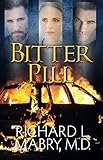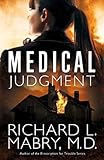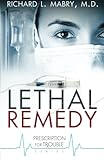|
Dr. Richard Mabry interview with Susan Sleeman
|
|
April 13, 2013
A. For thirty-six years, I was a practicing physician, the last ten spent as a professor at the University of Texas Southwestern Medical School. Although I’d had over 100 papers published in scientific journals and either written or edited eight textbooks, I had no idea of writing outside the medical field until 1999 when my first wife died. I used journaling as a coping mechanism, and eventually took excerpts from that journaling as the basis for a book, The Tender Scar: Life After The Death Of A Spouse, which was published in 2006. It was at that time that I also began trying to write fiction, and in 2008 I got the contract for my first novel. Q: Do you write in only one genre and if so which one and why? If not, which ones and why? A: I’ve always written in the area of medical fiction, mainly because that’s what I know. When I first started out, though, I wrote straight medical novels…and they bombed. I tried medical romance…no way. Then I tried my hand at cozy mysteries…another failure. Finally, I decided that, since I’d always enjoyed reading mysteries and thrillers, I’d try medical suspense. It worked, and I’ve never looked back. Q: How does your faith play into your writing? A. When I first began writing Christian fiction (and there was never any doubt in my mind that was what I’d write), I figured you had to have a conversion scene, a presentation of the Roman Road, lots of prayers and Scripture quotations. I soon discovered that I wasn’t comfortable with that, so I started writing about the real problems real Christians encounter and what happened next—some good, some bad. Now I write from a Christian worldview, trying to convey the message of ultimate hope, no matter how bleak things may look at the time. Q: How do you choose your settings for your books? A. Familiarity. I chose as a setting for my first novel an amalgam of the small town in Texas where I grew up and the slightly larger one where I went to college. The next novel was set in Dallas (where I’d lived since starting medical school). Subsequent novels were always set in North Texas, sometimes in Dallas, sometimes in a fictional city (based on a real one, whose name shall remain a secret). Q: Do you base your characters on people you know or are they totally made up? A: My characters are purely fictional, although sometimes when I’m populating a new book I’ll make notes such as “Think (a doctor I know) with attitude,” or “Physical attributes of (a well-known pro football player).” The actions are also mainly made up, although a few situations are based on real experiences, either mine or a colleague’s.
A: In Stress Test, the hero, Dr. Matt Newman, is kidnapped from the medical center’s parking garage at 2 AM when he leaves after an emergency case. He’s put into the trunk of his car and taken on what is supposed to be his last ride. He manages to escape, but sustains a head injury that requires emergency surgery. When he awakens in the ICU, he discovers that he’s now wanted for murder. His hope lies with attorney Sandra Murray, a feisty redhead who’s just out of a relationship with Matt’s neurosurgeon, and wants nothing further to do with doctors. Q: Where did you get your inspiration for Stress Test? A: When I walked into the parking garage of the medical center where I was on the faculty, I thought to myself how it would make a good setting for a late-night kidnapping. As author Alton Gansky taught me, I began to ask myself “What if?” Pretty soon, I had the start of Stress Test. Q: What is the main thing you hope readers remember from this story? A: No matter how bleak the outlook, God is sovereign. He’s in control, not us. We may not see what’s coming next, but He does…and He’s got it covered. Q: Tell us what you like about the main characters of this book. A: Matt Newman is struggling with his faith. Sandra Murray is firm in hers—sometimes too firm. But together, they make it work. Q: Would you share with us what you are working on now? A. As you know, sometimes a year elapses between writing a book and its publication. I’ve already completed my next novel, Heart Failure, which Thomas Nelson will release this fall. In it, a widowed doctor finds that the man she thought would fill the hole in her heart left by the death of her husband isn’t who she thought he was…literally. I’m just putting the finishing touches on the novel scheduled for next spring. (By the way, these are all freestanding, not a series). In Critical Condition, the shooting death of an ex-convict in the front yard of a surgeon plunges her into a whirlwind of violence as well as stirring up fears buried deep in her subconscious. Q: If money were no object what vacation would you like to take and why? A. I’d go to Germany and vacation at the little inn in the Black Forest where Kay and I had such a wonderful time ten years ago. And I’d hope the same waiter was there, the one who spoke flawless English to Kay but insisted he only understood me when I used my college German on him. Q: What is the silliest thing you have ever done? A. You mean, other than deciding to try my hand at writing novels? Probably walking across the Capilano Canyon suspension bridge outside of Vancouver, British Columbia. I’m deathly afraid of heights (despite three years spent in the Air Force), and this thing was 230 feet in the air, swaying with every step, and the 450 foot length seemed about three times that long. Of course, once I got to the other side…that’s right. I had to turn around and walk back. I almost took out Canadian citizenship and stayed there. Q: What is the hardest thing you have ever done? A. Seriously, getting through the death of my first wife, Cynthia. She died suddenly, two weeks after she retired and just before I was to follow in retirement so we could travel and take it easy. We had forty wonderful years together, produced three lovely children, and when she died, I felt that my life was over. Fortunately, God has blessed me once more with the love of a wonderful woman, and Kay and I have just celebrated our twelfth wedding anniversary. Q: Where can readers find you on the internet? A. My web page is http://rmabry.com, and I blog twice a week at http://rmabry.blogspot.com. I also have both a Facebook page (RichardMabry) and a Facebook fan page (rmabrybooks), and have been known to tweet as well. Q: Anything else you’d like to tell or share with us? A. If you like medical fiction, especially thrillers that hold your interest but won’t make you jump at every noise, I hope you’ll try Stress Test. And to celebrate the launch of Stress Test, if you’d like a chance to win a Nook HD, go to this site before April 27, 2013 and enter. https://promoshq.wildfireapp.com/website/6/contests/321132 |
Warning: getimagesize(https://www.thesuspensezone.com/wp-content/uploads/2014/08/susanamazon-200×300.png): failed to open stream: HTTP request failed! HTTP/1.1 406 Not Acceptable
in /home/susans16/thesuspensezone.com/xxss_class/Utils.class.php on line 849
Warning: Division by zero in /home/susans16/thesuspensezone.com/xxss_class/Utils.class.php on line 856


Dr. Richard Mabry is a retired physician, now author of “medical mysteries with heart.” He has written one non-fiction book, six novellas, and twelve published novels. His works have been a semifinalist for International Thriller Writers’ debut novel, finalists for the ACFW Carol Award, Inspirational Reader’s Choice, and Romantic Times’ Reader’s Choice and Reviewer’s Choice Awards, as well as winner of the Selah Award and the 2017 Christian Retailers Best. His most recent work is his novel, Critical Decision.
Richard and his wife live in north Texas. In addition to occasional efforts (thus far without results) to improve his golf game, he tries to convince his family that sitting at his desk staring into space does indeed represent work.







 Q: How long have you been writing and what other careers or jobs have you had?
Q: How long have you been writing and what other careers or jobs have you had?  Q: Would you tell us about your current book release Stress Test?
Q: Would you tell us about your current book release Stress Test? 






Leave a Reply